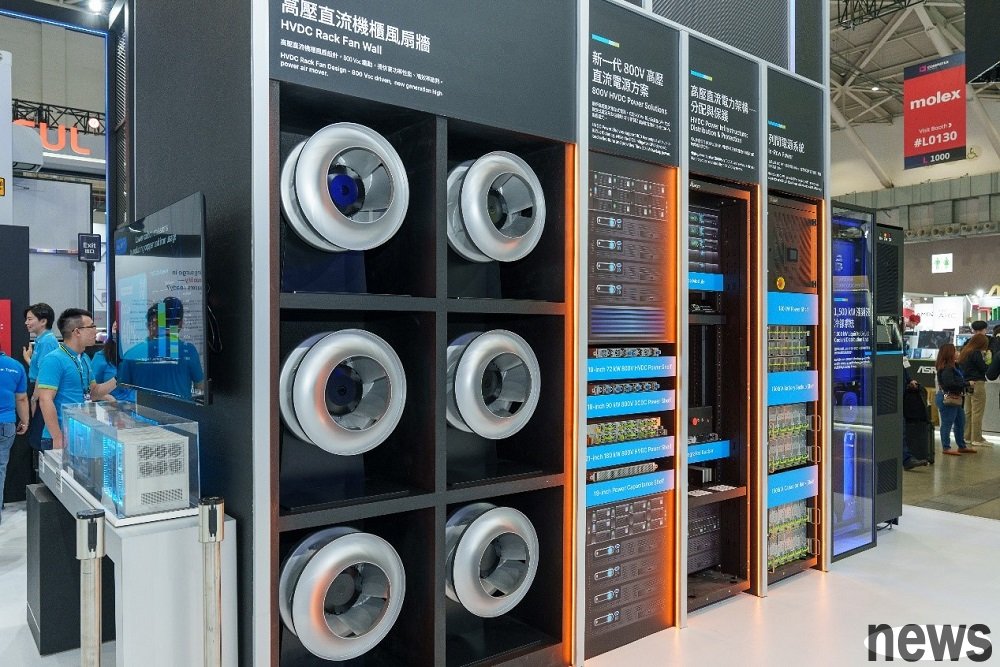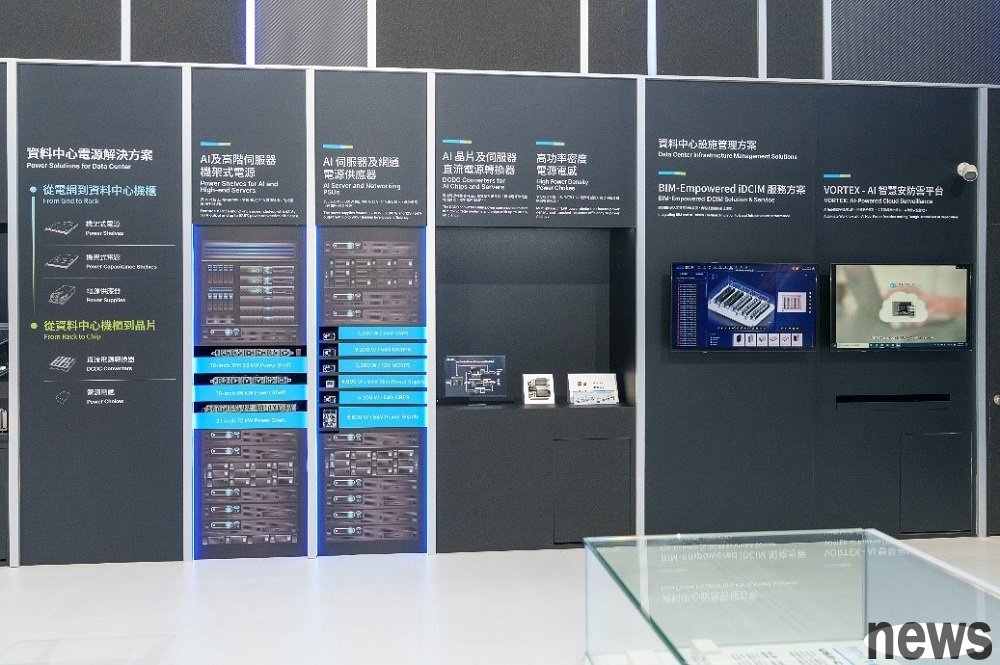As the era of AI, there is no limit to influence. From our daily lives to outer space, we can see all kinds of AI applications. NVIDIA executive chief Huang Rensheng pointed out at the GTC 2025 that the current AI development process has evolved fro...

As the era of AI, there is no limit to influence. From our daily lives to outer space, we can see all kinds of AI applications. NVIDIA executive chief Huang Rensheng pointed out at the GTC 2025 that the current AI development process has evolved from the initial perceptual AI (Perception AI) to the current mainstream I (Generated AI), and is about to enter the era of agent AI (Agentic AI). Next, the robot world driven by physical AI (Physical AI) will arrive in full swing and slam toward the goal of general artificial intelligence (AGI) at full speed.
In order to meet these application needs, the specifications of AI-based infrastructure led by AI servers are also constantly upgrading, resulting in a sharp increase in demand power and a new high in global data center power consumption. Therefore, seeking more efficient power modules and heat dissipation solutions has become the primary consideration for data centers and cloud operators in promoting comprehensive ESG transformation.
A single cabinet 600kW is expected in the era, and the demand for power and heat dissipation is hotThe reason why AI technology can make continuous breakthroughs is the support of powerful computing power, and the key to improving computing power is GPU innovation. But the price that comes with it is the demand for power "high water" and this is a clue from the latest data center GPU development route published by NVIDIA at this year's GTC Conference.
The GB300 (Blackwell Ultra NVL72) will be launched in the second half of this year, with a performance of 10 times higher than the previous generation Hopper, and a single chip power consumption is 15-20% higher than that of GB200, reaching 1,400W, and a single tank power of 120kW. It is expected that in 2026 and the second half of 2027, NVIDIA will launch Vera Rubin NVL144 and Rubin Ultra NVL576 respectively. The former is 3.3 times that of GB300, and the latter is 14 times more efficient, which is more amazing in energy consumption. With the increase in power of a single cabinet, how to consider the sessions can become an important topic.
Power and heat dissipation large manufacturer Taiwan Power Technology Development also pays attention to the challenges brought by power by electricity. According to market data, the overall power consumption of the four major cloud giants in the United States in 2023 will reach about 200 terawatts (TWh, 1TWh is equivalent to 100 kilowatts per hour), and it is estimated that it will rise by more than 700 terawatts in 2030, with an annual synthesis rate of about 23%. Zheng Xie Xiong, deputy general manager of Telda Power and Systems Group, pointed out that in the event of the surge in power consumption in computing power-based facilities, reducing non-computer energy consumption, such as heat dissipation and voltage conversion, is more important. Therefore, Telda provides AI server customers and data center operators with a comprehensive solution of "From Grid to Chip" based on long-term R&D investment, technology patents, market cultivation and field experience.

▲ Zheng Xie Xiong, Deputy General Manager of Taida Power and Systems Group (Source: New Technology Report)
Delta's "Three Highs" power supply solution, precisely manages all power and dispersing power in the data centerZheng Xie Xiong said that this solution includes power supply and management solutions such as UPS continuous power system, rack-type power supply (Power Shelf), battery backup module (BBU), rack-type high-power capacitor module (PCS) to board-end DC-DC converter and power inductor (Power Choke). In addition, for the heat dissipation part, Telda also provides heat dissipation management solutions such as high-end 3D Vapor Chamber, Cold Plate in the liquid cooling area, Manifold, In-Rack CDU, Air Assisted Liquid Cooling, and even the latest Liquid to Liquid water-cooling heat dissipation and other heat dissipation management solutions.
Through this solution, it can significantly reduce unnecessary energy consumption from the Internet to the chip side. It is also the only power plant in the world that can provide a complete power solution for high-pressure power from the Internet side to the chip side. This is the most different from Telda and other competitors.
This solution is not available overnight, but rather the result of Tel. Its requirements for power and heat dissipation design quality and the long-term observation and layout of data center areas. In terms of power, Zheng Xie Xiong pointed out that the research and development of Telda's power supply products has always been moving towards the "three highs" of high efficiency, high density and high power, and the above-mentioned AI data center is no exception. This persistence is an important key to Telda's stable power supply to AI equipment and reducing unnecessary consumption during the power supply process.
For this reason, at the NVIDIA GTC conference last year, Delta became the only power and heat dissipation solution manufacturer invited to participate. This year, it also exhibited a number of AI data center power and heat dissipation solutions designed in cooperation with NVIDIA to support the next generation of GPU architecture. The most attractive of these is the new high-voltage DC (HVDC) transmission solution designed for IT cabinet cooperation..

▲ For the future trend of high-power growth in data centers, Delta exhibited a series of high-voltage DC power supply and heat dissipation solutions during the COMPUTEX exhibition (Source: Delta)
Due to the demand for higher watts of IT cabinets, the new 800V high-voltage DC transmission solution is out of stockHigh pressure DC transmission solution is to understand the problem of continuous increase in power of a single tank, resulting in a sharp increase in current and insufficient IT tank installation space. Zheng Xie Xiong said that when the power demand for AI servers increases, the cabinet will not have enough space to support a larger power supply; even if it can, the heat will not be discharged smoothly. Therefore, it is expected to begin to develop towards the independent new architecture of the power module and IT Rack, derive the concept of the power power Rack.
According to current trends, future power cabinets will change the traditional single phase power to three phase power, allowing the IT cabinet to receive 800V high-pressure DC, which is an unprecedented new transformation on AI servers in the past. Modifying three-phase power has its advantages. First, it can ensure high efficiency and high density of the power supply, secondly, it can achieve three-phase balance, and finally because there is no zero wire, the input wire size can be reduced.
The power tank contains AC-DC rack-type power supply, which can convert the voltage to 800VDC and transmit it to the IT tank, and then reduce the pressure of 800VDC to 48VDC through the DC-DC rack-type power supply to meet the IT tank voltage requirements. Through this method, more computing power devices such as GPUs can be installed in the cabinet space, thereby further improving the computing power and power of the IT cabinet single machine.
Another key to stable AI data center operation is the GPU's load on the Internet. When AI servers are conducting training or reasoning, they may cause shocks on the power supply environment due to excessive or rapid load vibration, resulting in unstable or even power skipping. In this regard, Telda has launched a rack-type high-power capacitor module that can quickly charge and discharge through built-in super capacitors, thereby minimizing the impact of load changes on the Internet. In addition, if the power network suddenly breaks, the capacitor module can also provide 15 seconds/20kW of power output to avoid data loss.
Delta vertical power supply technology, reducing chip power supply transmission circuit and consumption
▲ Delta has launched a number of server power suppliers and DCDC converters to supply power and voltage conversion to the internal components of the AI data center (Source: Delta)
After the power is converted through the layer of power, Telda reduces energy consumption through vertical power supply (also known as "backward power supply") technology. Traditional chip power supply is power supply through a voltage regulator module (VRM) on the same motherboard. The current is transmitted horizontally, and the path from VRM to chip is difficult to reduce. Through the latest vertical power supply, the power transmission path can be further shortened. For this purpose, Telda designed a DC-DC power module installed behind the wafer to effectively avoid unnecessary transmission consumption and improve overall efficiency.
In terms of heat dissipation management, Delta has also launched many new products and new designs. Among them, the newly released 1.5MW liquid-to-liquid-cooled liquid dispensing device (L2L CDU) has obtained NVIDIA's recommended and qualified supplier qualifications, demonstrating the ability to dissipate heat from multiple high-power density tanks at the same time.
With the rapid development of AI technology, AI servers and data centers have entered the high-power/high-watt data era, which has also allowed Telda's long-standing power and heat dissipation technology to solve the power supply challenges brought by AI servers and data centers. Zheng Xie Xiong said that now Taida not only provides comprehensive solutions to various AI fields, but also comes back to make AI an important tool to assist product design or factory intelligent manufacturing, and embed AI functions into products developed by Taida, making various edge products more intelligent.
For customers with strong demand for high-power power and high-efficiency dispersion, Delta provides a complete overall solution that perfectly solves compatibility problems between products of different brands, and can save the redundant verification procedures of different products in combination and cooperation, thereby reducing costs, accelerating product deployment and up-line, helping cloud and various corporate partners to reduce unnecessary energy consumption while developing AI technology and creating a green AI ecosystem.